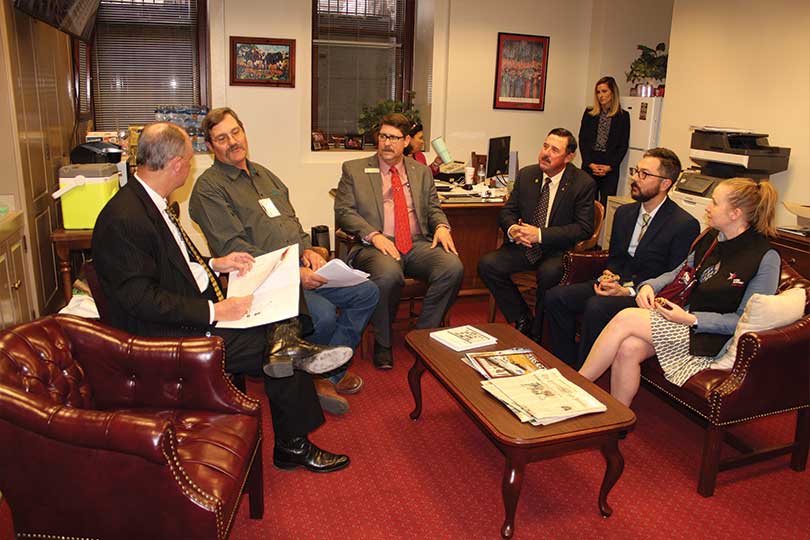By Jennifer Dorsett
Field Editor
Texas Farm Bureau (TFB) members headed to Austin this week for the biennial TFB Leadership Conference, which is held at the beginning of every state legislative session.
More than 400 farmers and ranchers then took to the Capitol to stress the importance of certain issues for agriculture and rural Texas.
“We can literally change the course of Texas while we’re here in Austin this week,” TFB President Russell Boening said. “Our leadership conference is the time when we come together and put the thoughts and ideas of our policy into action.”
And the policy set by TFB members in December was clear: Eminent domain reform is vital to private property owners in rural, suburban and urban Texas.
At the conference, members heard from speakers and panelists on eminent domain reform, fever tick control, water and other priority issues identified through statewide policy development meetings held last fall.
On Monday, Gov. Greg Abbott spoke to TFB about his legislative priorities for the year, including property tax reform, school finance reform and teacher pay increases. But he let members know he hadn’t forgotten about private property owners and rural Texans.
“I look forward to working with the Farm Bureau this session on the issues that are most important to you,” Abbott said. “These issues include preserving the farming and ranching heritage that we have here in the Lone Star State, and it includes protecting your private property rights.”
Abbott also met with the TFB board of directors to further discuss eminent domain reform and agricultural-use property tax exemptions.
Lt. Gov. Dan Patrick talked with TFB’s board of directors and members, as well, highlighting the importance of rural Texas to the state’s economy.
“Texas is the tenth largest economy in the world,” Patrick said. “Our agricultural imports and exports are important. Water is important. Rural Texas is important. You take risks, and you impact 100 percent of Texans. Everyone uses your products.”
Panelists spoke with TFB members and explained the eminent domain reform legislation filed in both chambers of the Texas Legislature last week. They outlined how those changes would help landowners receive fair processes when dealing with private entities using eminent domain.
TFB leaders visited the Capitol on Tuesday to discuss eminent domain reform and share testimonials of how the issue has affected them personally.
Sometimes it was a pipeline being built and other times it was an electrical transmission line, but the issues remained the same. Threats, lack of information, unequal treatment among neighbors and property damage are recurring themes when landowners deal with private businesses taking their property for public good.
Many legislators expressed support for the bill.
Farmers and ranchers said, in the meantime, they plan to continue advocating for eminent domain reform.
“We’re gearing up for the biggest state property rights battle that we’ve faced in decades,” Boening said. “Always remember that you are the smartest person in the room when it comes to your farm or ranch. No one can better express the impacts of a federal or state law or regulation on your operation.”


Taking private property for parks and trails is a much bigger problem than pipelines. With the amount of new people moving to Texas, there is an effort to take private property to do just that.
It would be very helpful when eminent domain is being exercised to take the actual property for the land owners to be given an extension of time for the land owner to be able to reinvest their money. Farmers spend lifetimes buying paying for, and working a piece of property but are only given six months to identify a new property and 12 months to close on one. They spend lifetimes building that wealth but then we make them spend sometimes millions in less than a year. I think some simple revisions to the 1031 rule
For these specific cases would be extremely helpful